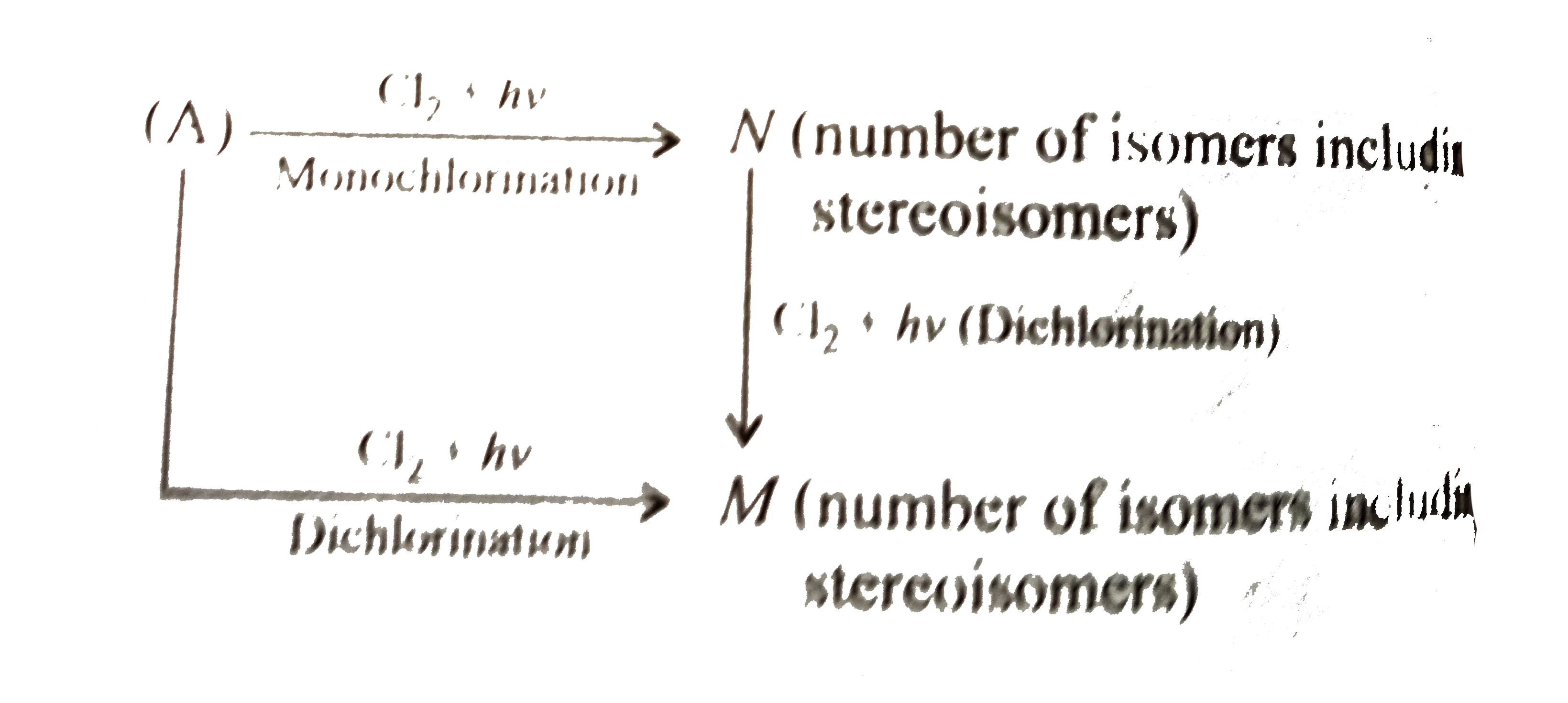When a hydrocarbon A undergoes combustion in the presence of air, it requires 9.5 equivalents of oxygen and produces 3 equivalents of water. What is the molecular formula of A?
C9H6
C6H6
C8H6
C9H9
The correct Answer is:C
To find the molecular formula of the hydrocarbon A, we will use the information provided about the combustion reaction.
1. Understand the Combustion Reaction:
The general combustion reaction for a hydrocarbon (CnHm) can be written as:
CnHm+(n+m4)O2→nCO2+m2H2O
Here, n is the number of carbon atoms and m is the number of hydrogen atoms in the hydrocarbon.
2. Set Up the Equations:
From the problem, we know:
- The amount of oxygen used is 9.5 equivalents:
n+m4=9.5
- The amount of water produced is 3 equivalents:
m2=3
3. Solve for m:
From the second equation, we can solve for m:
m2=3⟹m=6
4. Substitute m into the First Equation:
Now substitute m=6 into the first equation:
n+64=9.5
Simplifying this gives:
n+1.5=9.5⟹n=9.5−1.5=8
5. Determine the Molecular Formula:
Now that we have n=8 and m=6, we can write the molecular formula of the hydrocarbon A:
C8H6
Final Answer:
The molecular formula of hydrocarbon A is C8H6.
The general combustion reaction for a hydrocarbon (CnHm) can be written as:
CnHm+(n+m4)O2→nCO2+m2H2O
Here, n is the number of carbon atoms and m is the number of hydrogen atoms in the hydrocarbon.
From the problem, we know:
- The amount of oxygen used is 9.5 equivalents:
n+m4=9.5
- The amount of water produced is 3 equivalents:
m2=3
From the second equation, we can solve for m:
m2=3⟹m=6
Now substitute m=6 into the first equation:
n+64=9.5
Simplifying this gives:
n+1.5=9.5⟹n=9.5−1.5=8
Now that we have n=8 and m=6, we can write the molecular formula of the hydrocarbon A:
C8H6
The molecular formula of hydrocarbon A is C8H6.
Topper's Solved these Questions
Similar Questions
9 volumes of a gaseous mixture consisting of a gaseous organic compound A and just sufficient amount of oxygen required for complete combustion, yielded on burning, 4 volumes of CO2, 6 volumes of water vapour and 2 volumes of N2, all volumes measured at the same temperature and pressure. If the compound A contained only C, H and N, (i) how many volumes of oxygen are required for complete combustion, and (ii) what is the molecular formula of the compound A?
View Solution15 mL of a gaseous hydrocarbon was required for complete combustion in 357 mL of air (21% of oxygen by volume) and the gaseous products occupied 327 mL (all volumes being measured at NTP). What is the formula of the hydrocarbon?
View Solution
Knowledge Check
What is the decimal equivalent of 3 58?
A3.58B3.85C3.65D3.6250.5g of hydrocarbone gave 0.9g water on combustion . The percentage of carbon in hydrocarbon is
A75.8B80.0C56.6D28.6If V mL of a gaseous hydrocarbon after explosion with excess of oxygen showed a contraction of 2.5V mL and further contraction of 2V mL with potash. What will be the molecular formula of hydrocarbon?
AC2H4BC2H6CC2H2DC3H8
Urea(H2NCONH2) is manufactured by passing CO2(g) through ammonia solution followed by crystallization. For the above reaction is prepared by combustion of hydrocarbons. If combustion of 236 kg of a saturated hydrocarbon (CnH2n+2) produces as much CO2 as required for production of 999.6 kg urea then molecular formula of hydrocarbon is:
View Solution40 mL. of a hydrocarbon undergoes combustion in 260 ml of oxygen and gives 160 ml of carbondioxide. If all gases are measured under similar condtions of temperature and pressure, the formula of hydrocarbon is
View SolutionIn the combustion of 5.00 g of a metal, 9.44 g of metal oxide are formed. Hence, equivalent mass of the metal is
View SolutionFifteen milliliters of gaseous hydrocarbo (A) was required for complete combustion 357 ml of air (21 % oxygen by volume) and gaseous products occupied 327 ml (all volumes being measured at STP).

The molecular formula of the hydrocarbon (A) is:
View SolutionA gaseous hydrocarbon was exploded with excess of oxygen. On cooling a contraction of 1.5 times the volume of the hydrocarbon was observed. When treated with NaOH a further contraction of double the volume of the hydrocarbon was noted. The molecular formula of the hydrocarbon is:
View Solution
